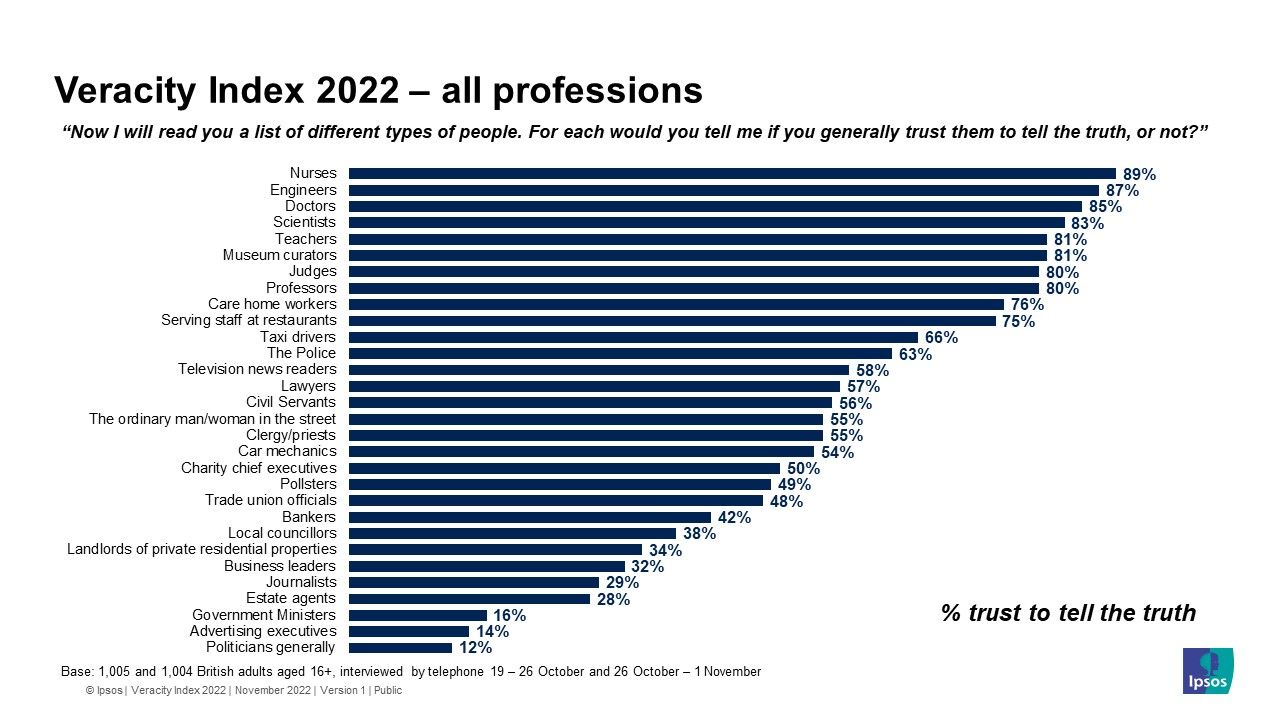Why leaders lie (the depressing truth)

Have you ever listened to a politician and questioned the sincerity of their statements? If so you are not alone, in a recent 2022 Ipsos poll, politicians came out at the bottom of the list of people most trusted in British society:
https://www.ipsos.com/en-uk/ipsos-veracity-index-2022

Now, I am not sure as to what the exact reason for this is, but I do suspect it is because people seem to have an innate mistrust of politicians borne out by repeated examples of broken promises. Perhaps this is because, certain statements that politicians make are not correct, and in the worst cases turn out to be outright lies.
Which brings me onto the topic of lying by politicians, specifically in the arena of foreign relations. This whole concept came out from a lecture that I watched, in which the political scientist, John Mearsheimer discussed his book, "Why leaders Lie."
I was already a fan of John Mearsheimer for his no nonsense approach to geopolitics, so this was an appealing presentation for me to digest. His style and delivery of the subject matter is highly engaging, and makes the lecture an easy watch in my opinion.
In this post, I will try my best to summarise the lecture, which I found to be so gripping.
- Lying makes strategic sense.
The opening statement of the lecture is that lying is a useful tool of statecraft, and that leaders lie because it is advantageous to them at that particular moment in time. There is selfish lying which benefits a person and strategic lying which benefits a country. The lecture mainly deals with strategic lying.
2. Some lies are noble lies.
Next, Professor Mearsheimer talks about different types of lies. Strategic lies, such as the ones used to invade Iraq are told because it is thought to benefit the leader's country. He argues that some strategic lies are actually noble in nature, because the lies told prevented a much bigger crisis from occurring.
An example of a noble lie he uses in the lecture is President Kennedy during the Cuban missile crisis. Unknown to me, the only reason that the USSR removed the missiles from Cuba was because the USA had removed their Jupiter missiles from Turkey. This fact was not disclosed to the public, and it was made out that the USSR was the aggressor and was forced into a humiliating climbdown.
3. There are five types of international lies told by politicians :
1. Interstate lies. This is where one leader of a country lies to the leader of another country. An example he uses in the lecture was the fact that the USA told the USSR that should they invade Europe, nuclear weapons would be used to defend Europe. It turns out, years later, that these statements were a bluff. As bad as Europe getting invaded was, the spectre of the USA being annihilated by a Russian nuclear onslaught was worse. But the lie was told, so as to deter the Soviets from attacking in the first place. Obviously, the lie worked, and WW3 did not occur.
2. Fear mongering. This one is pretty self explanatory, but this time it involves a politician lying to his or her own people, usually exaggerating a threat of some sort. A painful recent example is the Gulf War of 2003. In order to sell the war to a skeptical public, the threat posed by Iraq had to be exaggerated way beyond what was actually true, in order to scare people into accepting the unpopular war.
3. Strategic cover ups. The example of the Cuban missile crisis is used again to illustrate this point.
4. Nationalist myth making. This is where a country revises history for its own benefit, painting itself to appear in a better light than what the actual history suggests.
5. Liberal lies. The case of "Bomber" Harris from WW2 was used to illustrate this type of lie. The British insisted they were only bombing industrial targets in Germany when in fact they were bombing civilian targets.
Towards then end of the lecture, he describes two main findings that he came across as he wrote his book. The first is that interstate lying does not occur that often, in other words leaders rarely lie to other leaders. The second, and more shocking finding is that leaders more often lie to their own people than they do foreign audiences. He says that fear mongering is a particular affliction of the American political system.
Professor Mearsheimer explains that states tend not to trust each other, so it is difficult to lie to another country. Domestic audiences by comparison tend to trust their own leaders, so lying to them is much easier than lying to a foreign audience.
At the end of the lecture, we are told of two distinct downsides of international lying:
- Blowback. This is when a leader lies to his/her domestic audience about foreign policy but then begins to lie about domestic policy as well. The leader begins to feel that the public at large needs to be repeatedly manipulated in order to foster a desired outcome.
- Backfiring. This is when, despite the successful execution of the lie, the resultant policy that was pushed through (e.g. the Gulf War in 2003) ended up being a total failure. Fear mongering, the Professor argues, is a double edged sword as when the public realises that they have been lied to, distrust of the political system increases.
The most shocking (and final) statement of all in this lecture, is that the societies that fear monger the most (and by extension lie the most) and who are most likely to start wars, are in fact, democracies.
So where does this leave us? We have to accept that not everything our leaders tell us (especially when it comes it foreign policy) is truthful. Now to some of us seasoned cynics, this just confirms what we have long suspected. To other people, this may come as a shock, as they historically have had more faith in their elected representatives.
Not only do we have to accept that our leaders regularly lie to us, but that these lies have strategic value and is an essential tool of governorship. So next time your President or Prime Minister is on TV and makes some sort of bold statement, especially foreign policy related, take a moment and ask yourself, how plausible is this? Not to be too negative, but if we accept that lying is part and parcel of politics then perhaps we should not be too disheartened when we eventually find out that we have indeed, been lied to in one form or another.
Perhaps this is why politicians are bottom of the table when it comes to the trust game. People seem to have an instinctive grasp of the nature of political lying. As to what the solutions are, your guess is as good as mine. Perhaps there is no solution, and we just have to accept being lied to.
That is one bitter pill to swallow.